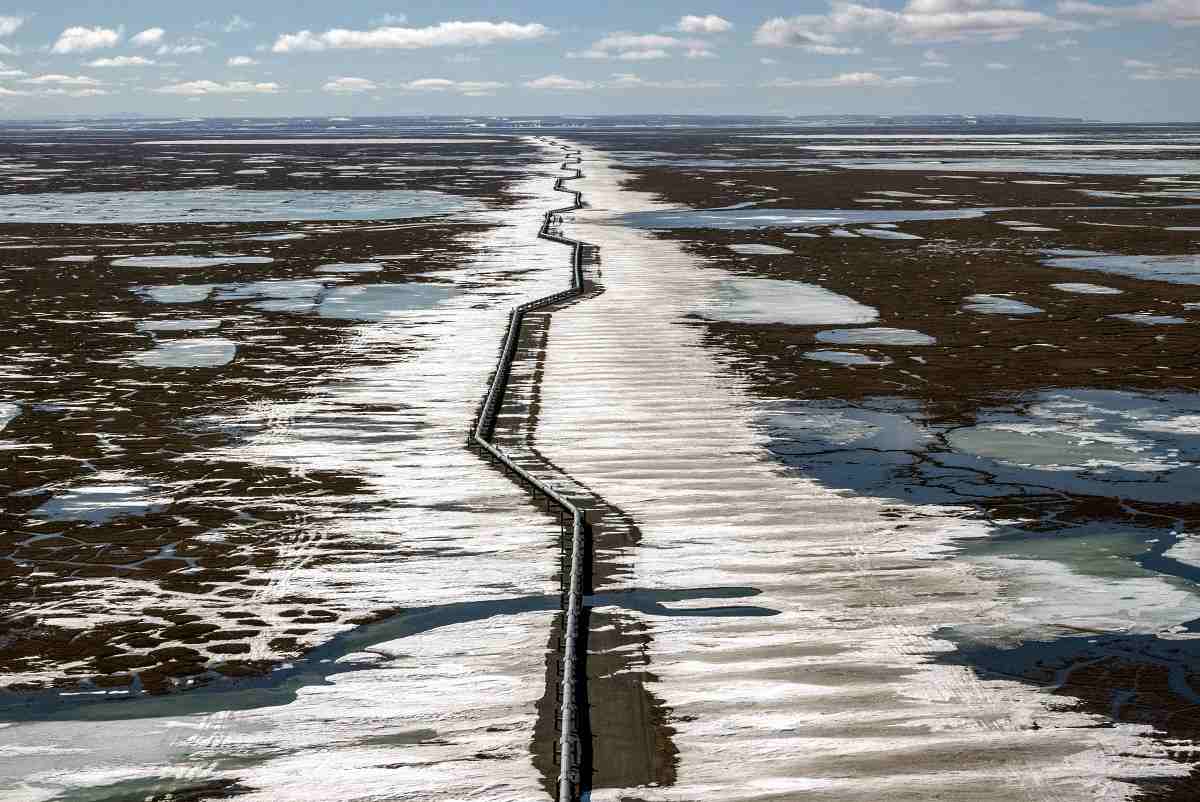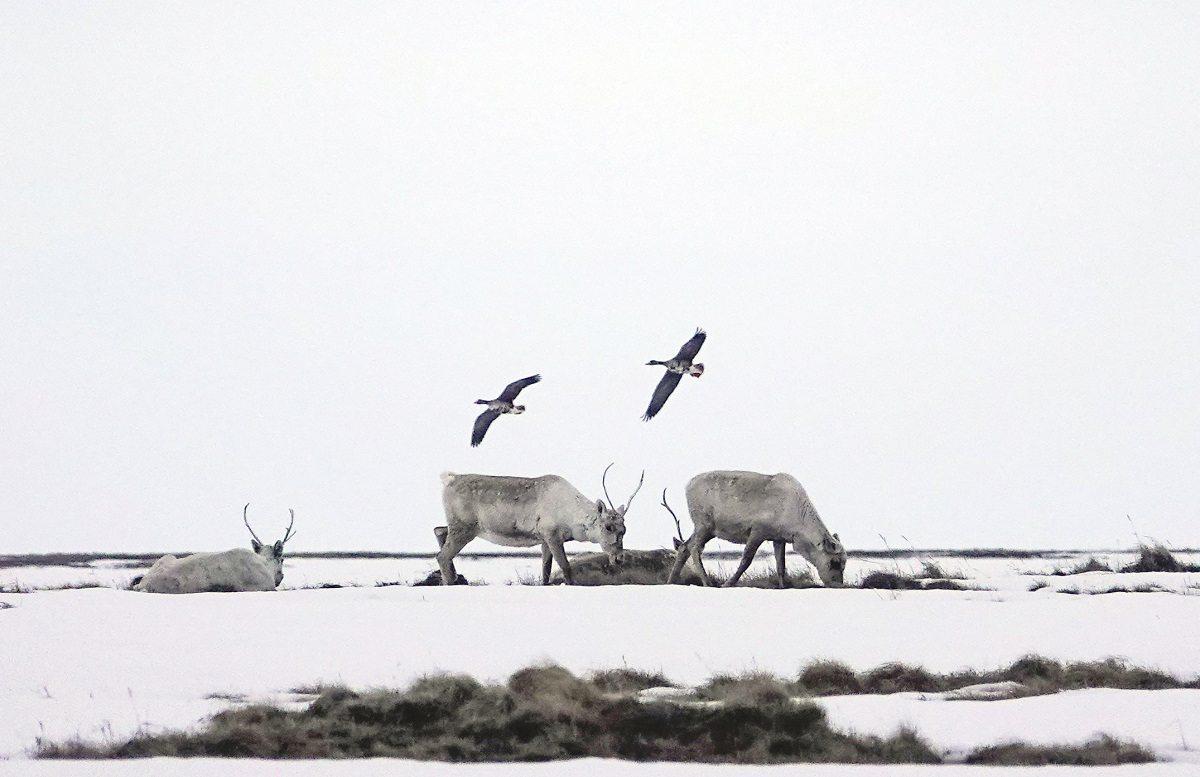
An oil pipeline stretches across the landscape outside Prudhoe Bay in Alaska’s North Slope Borough in 2019.
13:15 JST, September 7, 2023
President Biden moved Wednesday to protect more than 10 million acres of Alaska’s North Slope from development, barring oil drilling across giant swaths and canceling leases in the iconic Arctic National Wildlife Refuge issued under President Donald Trump.
The conservation push covers nearly half of the National Petroleum Reserve-Alaska (NPR-A), the nation’s largest expanse of public land, which provides habitat for a range of sensitive Arctic wildlife, including caribou and shorebirds. It would impose a permanent ban on oil and gas development for 10.6 million acres of the reserve but would not block ConocoPhillips’ Willow project, which Biden approved there earlier this year and is poised to produce 576 million barrels of oil over the next three decades.
In a separate move, Interior Secretary Deb Haaland is canceling all seven outstanding leases the Trump administration awarded for oil exploration in the Arctic National Wildlife Refuge, in the state’s northeast corner. Drilling had been banned in the refuge, one of the nation’s most pristine natural areas, for decades until Congress ordered lease sales there in 2017. As a candidate, Biden pledged to undo those leases as part of his sweeping climate agenda.
In a statement, Biden said the state is full of “breathtaking natural wonders” that need protection.
“As the climate crisis warms the Arctic more than twice as fast as the rest of the world, we have a responsibility to protect this treasured region for all ages,” Biden said.
While the moves would do nothing to stop the Willow development – a top target of climate activists – it would ensure long-term protections for areas that provide vital wildlife habitat, said Chris Wood, president of the conservation group Trout Unlimited. He estimated that the federal government hasn’t set aside so many acres of land for conservation since the early 2000s.
“Conservation is a very long game and takes decades,” Wood said. “It’s rare to have these big-stroke opportunities. So it’s terrific and heartening to see the administration demonstrate they have a bit of a bold streak when it comes to protecting our lands and waters.”
The measures, however, did not get universal support from environmentalists. Biden has had difficulty satisfying climate activists, especially anti-oil activists upset by his administration’s direct approval of Willow.
Friends of the Earth late Wednesday called the new announcements “a half-measure.” “Small measures like the ones the Department of Interior put forward won’t erase President Biden’s incredibly disappointing climate record with respect to oil and gas leasing,” Raena Garcia, the group’s senior public lands and fossil fuels campaigner, said in a statement. “If the Administration is truly committed to protecting our people and the planet, they will halt climate-destroying projects like Willow altogether.”
Drilling in Alaska has complicated Biden’s attempt to enact aggressive measures to fight climate change. Oil advocates and industry analysts have said some areas of NPR-A are among the richest oil reserves available in the country, and Alaskan lawmakers have pushed development as a major source of jobs and revenue. But Biden had come to office promising “no more drilling on federal lands, period. Period, period, period.”
Alaska Oil and Gas Association President Kara Moriarty said in an email that the new Biden policies will make the United States more reliant on foreign oil, which could produce more planet-warming emissions than oil extracted in Alaska.
“The constant barrage of government regulation changes and whipsaws tells investors that Alaska is not a place to do business,” she said. That “makes no sense because Alaska has high environmental standards and some of the lowest emissions in the country.”
In March, Biden had approved Willow under intense political pressure, saying he was compelled to because the company had legal leases for the area that predated his presidency.
But he announced that decision along with a plan to give “maximum protection,” a status authorized by Congress, for another 13 million acres in the reserve. Wednesday’s move makes that plan an official proposal, including requirements for environmental mitigation for 2.4 million acres where oil leasing can still happen there, and the ban on oil and gas leasing for the rest of it.
The proposal would also require reviews and public consultation every five years on whether to expand or designate new special areas for conservation in the reserve. Interior’s Bureau of Land Management will also be hosting public meetings about the proposal and taking public comment for 60 days before creating a final rule.
“We know that some of these places are irreplaceable treasures,” Haaland said in remarks to reporters. “Climate change is the crisis of our lifetime. . . . We must do everything within our control to care for and protect this fragile ecosystem.”
On the Arctic National Wildlife Refuge, Haaland said the lease sale under Trump was flawed, “based on a number of fundamental, legal deficiencies.” The Bureau of Land Management and the Fish and Wildlife Service have drafted a new analysis under Biden supporting that conclusion, administration officials said.
They found that Trump officials failed to meet requirements under the National Environmental Policy Act to analyze alternatives or to quantify greenhouse gas emissions from the development, administration officials said. That led Haaland to cancel the leases, administration officials said.
The leaseholder, the Alaska Industrial Development and Export Authority, Alaska’s publicly owned development corporation, said the decision is unlawful. They said they would fight in court to keep the leases in place.
“This latest action by the Department of the Interior shows arbitrary disregard for Federal law, based on campaign trail rhetoric,” the organization said in a statement. “Campaign promises are not enough to justify this agency action.”
Many influential Alaska lawmakers, including Sen. Lisa Murkowski (R), fought for decades to open up part of the region’s coastal plain for drilling, and inserted requirements to lease oil rights in the area as part of a 2017 tax law overhaul. Local officials who support drilling have called Biden’s attempts to undo the leases federal overreach.
“These decisions are illegal, reckless, defy all common sense, and are the latest signs of an incoherent energy policy from President Biden,” Murkowski said in a statement Wednesday.
At the same time, oil companies in recent years have also shown waning interest in the refuge and are more interested in the NPR-A. Regenerate Alaska, a division of an Australian firm, was the only oil company to directly acquire a tract on the refuge’s nearly 1.6 million-acre coastal plain, and it voluntarily canceled its lease in 2022, after Chevron and Hilcorp, two other major oil companies, had also jettisoned their claims.
The NPR-A, roughly the size of Indiana, was officially designated for oil and gas development by the Naval Petroleum Reserves Production Act in 1976. The law created special rules for oil and gas extraction and set aside some areas for “maximum protection” of the environment.
Today, the area remains a sizable reserve for domestic supplies of oil but has become increasingly prized as an Arctic wildland, offering key habitat for polar bears, migrating caribou and waterfowl.
Climate activists and many environmentalists were dismayed March 13, when the Biden administration approved the Willow project, which according to federal officials could produce 576 million barrels of oil over 30 years.
ConocoPhillips has held leases to develop oil as part of the Willow project since the late 1990s. After roughly five years of permitting and legal fights, the Biden administration approved the project to have as many as three drilling sites with up to 199 total wells. It shrank the project from the five pads ConocoPhillips had originally proposed following recommendations from a government review to keep development out of a yellow-billed loon nesting site and caribou migration paths.

Caribou and geese in North Slope Borough, Alaska, in May 2019.
Top Articles in News Services
-

Survey Shows False Election Info Perceived as True
-

Hong Kong Ex-Publisher Jimmy Lai’s Sentence Raises International Outcry as China Defends It
-

Japan’s Nikkei Stock Average Touches 58,000 as Yen, Jgbs Rally on Election Fallout (UPDATE 1)
-

Japan’s Nikkei Stock Average Falls as US-Iran Tensions Unsettle Investors (UPDATE 1)
-

Trump Names Former Federal Reserve Governor Warsh as the Next Fed Chair, Replacing Powell
JN ACCESS RANKING
-

Producer Behind Pop Group XG Arrested for Cocaine Possession
-

Japan PM Takaichi’s Cabinet Resigns en Masse
-

Man Infected with Measles Reportedly Dined at Restaurant in Tokyo Station
-

Israeli Ambassador to Japan Speaks about Japan’s Role in the Reconstruction of Gaza
-

Videos Plagiarized, Reposted with False Subtitles Claiming ‘Ryukyu Belongs to China’; Anti-China False Information Also Posted in Japan
























